A regular domestic refrigerator is inadequate for keeping vaccinations, medicines, and other medical supplies safe. Medical-grade refrigerators are built to maintain exact temperature control, avoid contamination, and keep the contents secure.
This article will go through the numerous medical refrigerators available, such as pharmaceutical, blood bank, and biomedical fridges. We will go through their distinct features, benefits, and drawbacks so you can make an informed selection when choosing a medical refrigerator that matches your requirements.
What is a Medical-Grade Refrigerator?
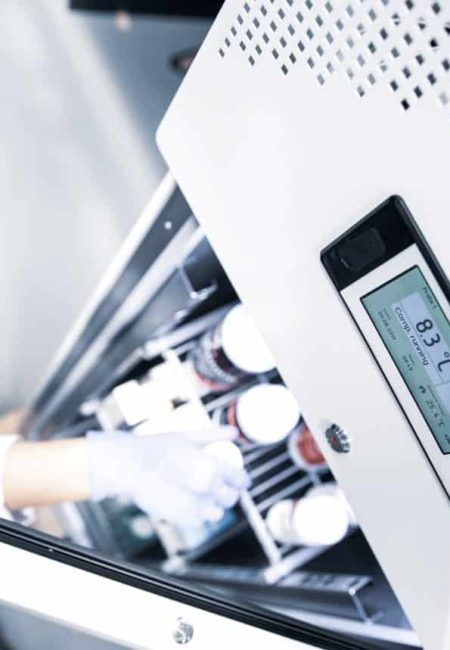
A medical refrigerator is a piece of specialised equipment used to store and preserve vaccinations, drugs, blood products, and other medical supplies.
Medical fridges, unlike consumer refrigerators, are equipped with modern temperature monitoring and control systems to ensure a constant and safe storage environment.
They are also intended to avoid contamination by providing secure storage for vital objects that may be harmed by exposure to the elements.
Medical fridges come in several sizes and types, as well as for a variety of contents, including pharmacy, blood bank, and laboratory refrigerators, each with its own set of features and capabilities.
These specialised refrigerators are vital tools for healthcare workers who rely on the quick and secure delivery of critical medicinal supplies.
Types of Medical Fridges Available
There are several types of medical refrigerators on the market, each with its unique set of storage capabilities.
Vaccines, medicines, and other pharmaceuticals that require precise temperature control are stored in pharmacy fridges.
Blood bank refrigerators are specifically intended to keep blood products, such as whole blood and platelets at a constant temperature and humidity level.
Reagents, cultures, and other laboratory samples that require temperature stability and contamination control are stored in laboratory fridges.
Ultra-low temperature freezers are designed to store biological samples and some vaccines at extremely low temperatures, often below -80°C. The WHO emphasises strict temperature control for vaccines and medications. A reliable medical fridge ensures compliance and prevents spoilage.
Finally, portable medical refrigerators are useful for carrying delicate medical goods between healthcare institutions, such as vaccinations and pharmaceuticals.
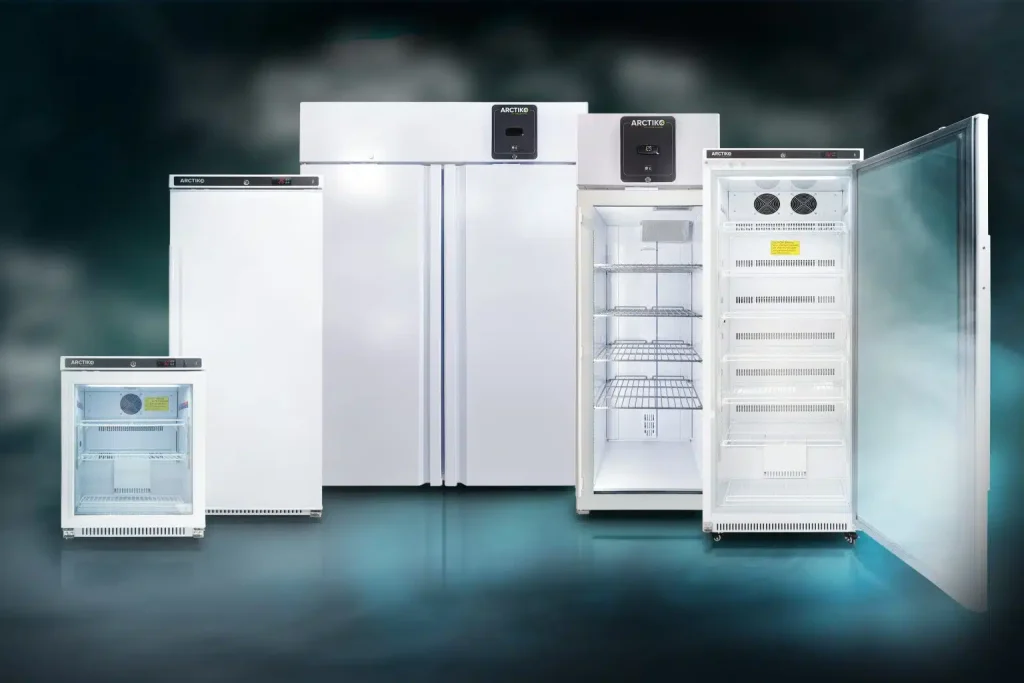
Pharmaceutical and Medical Fridges
Pharmaceutical and medical refrigerators are essential pieces of equipment for hospitals, pharmacies, and other healthcare facilities that need to store temperature-sensitive medications and vaccines.
These refrigerators are built to maintain a constant temperature range of 2°C to 8°C, which is excellent for most medications and vaccinations. They also contain alarms that notify personnel if the temperature falls outside of a predetermined range, ensuring the safety and effectiveness of stored pharmaceuticals.
Some pharmaceutical refrigerators include glass doors that allow workers to immediately identify the contents without opening the door, as well as locking devices to prevent unauthorised entry.
These features make pharmaceutical and medical refrigerators an essential investment for any medical facility that has to store temperature-sensitive drugs and vaccines safely and securely.
Blood Bank Refrigerators
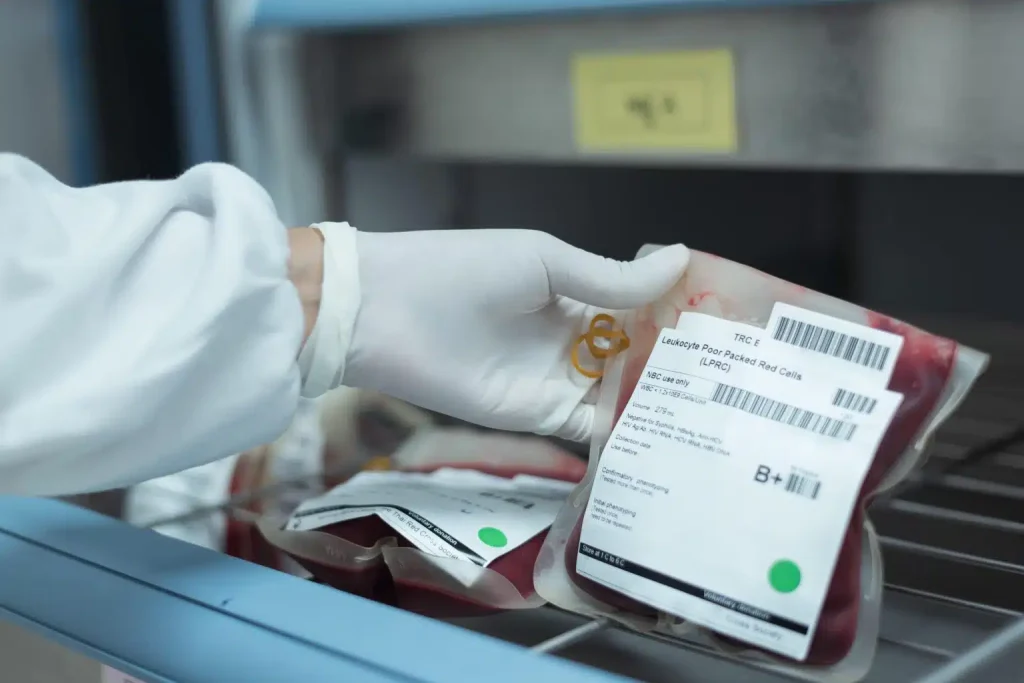
Blood bank refrigerators are specialised medical fridges designed to keep blood supplies, including whole blood and platelets, safe.
These refrigerators keep a continuous temperature range of 1°C to 6°C, which is the ideal temperature for blood storage, as the suggested temperature recommendation is 4°C to avoid bacterial development and preserve blood quality.
They also have alarms that alert employees to any temperature variations and can hold a significant volume of blood products.
Blood bank refrigerators are available in a variety of capacities to accommodate varying sizes of blood bags and other blood products.
They are also equipped with glass doors, which allow for the simple identification of stored blood products without the need to open the door.
Blood bank refrigerators are vital pieces of equipment for any medical institution that handles blood products because they serve a critical role in guaranteeing the safety and efficacy of stored blood products.
Combi Medical Refrigerators
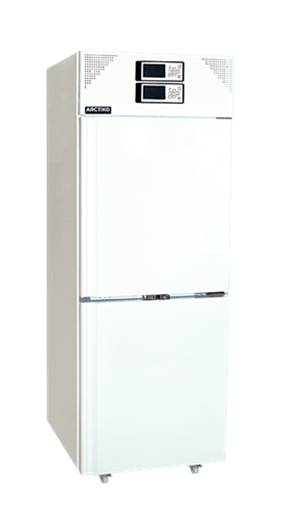
Combi medical refrigerators are specialised medical refrigerators that provide two temperature zones in a single unit. These refrigerators contain two chambers, one for refrigeration and the other for freezing.
Combi medical refrigerators are an ideal solution for establishments with limited space that require both refrigeration and freezer storage.
They are especially useful for facilities that need to keep a variety of medical materials, such as vaccinations and biological samples, which require varying temperatures for preservation.
Combi medical refrigerators often contain complex temperature control systems, alarms, and other features that protect the safety and usefulness of medical goods stored inside.
Combi models offer a flexible and cost-effective option for medical establishments that require both refrigeration and freezer storage.
Freezers
Medical freezers can be classified as ultra-low-temperature freezers, low-temperature freezers, and biomedical freezers.
Ultra-low temperature freezers are used to store biological samples, vaccines, and other medicinal goods at temperatures as low as -80°C.
In contrast, low-temperature freezers are used to retain medical supplies at temperatures ranging from -20°C to -40°C.
These freezers hold laboratory samples, vaccinations, and other medical supplies. To assure the safety and efficacy of stored items, all these types of medical freezer refrigeration contain advanced features such as temperature control systems, alarms, and backup power.
They are an essential tool for medical and research establishments because they play a key role in the storage and preservation of key medicinal supplies and biological samples
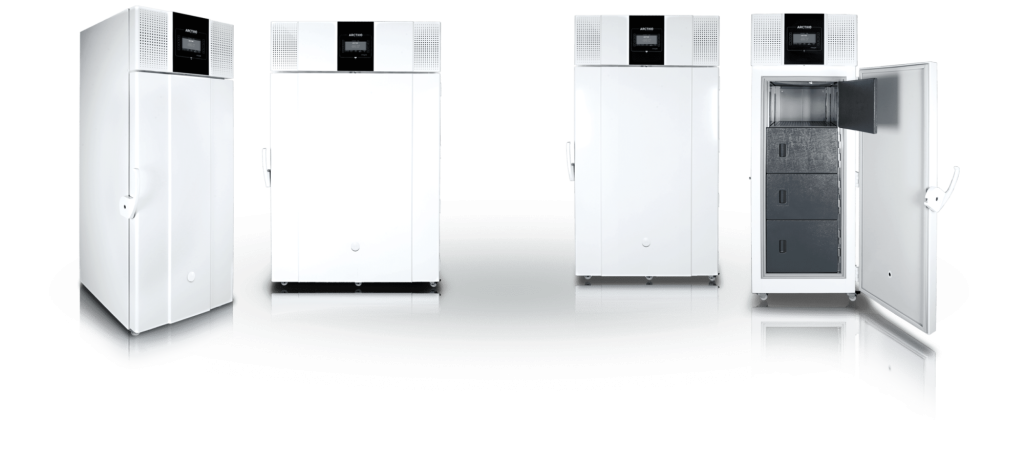
Refrigerators We Recommend
Do not compromise on the safety and efficacy of your temperature-sensitive medical supplies. Invest in high-quality refrigerators from ARCTIKO and enjoy peace of mind, knowing your products are stored at the optimal temperature. Contact us now to learn more and request a quote.
Pros and Cons of Medical Fridges
Medical refrigerators are required for the storage of temperature-sensitive medical supplies, vaccinations, and biological samples. Here are some of the advantages and disadvantages of medical refrigerators, such as ultra-low-temperature freezers, refrigerators, and biomedical refrigerators:
Pros:
- Medical refrigerators maintain stable temperatures, ensuring the safety and efficacy of stored items.
- To assure the safety and quality of stored items, medical refrigerators have sophisticated features such as alarms, backup power, and data logging capabilities.
- Medical refrigerators come in a variety of sizes and styles, making them perfect for keeping a wide range of medical items and samples.
- Medical refrigerators make stored items easily accessible, enabling efficient inventory management and retrieval.
Cons:
- Medical refrigerators can be costly.
- To guarantee maximum performance and prevent equipment failure, medical refrigerators require regular maintenance and calibration.
- Medical refrigerators use important space in medical institutions, restricting the amount of room available for other equipment and supplies.
While medical refrigerators have numerous advantages, such as temperature stability, sophisticated features, and adaptability, they also have some disadvantages, such as cost, energy consumption, maintenance needs, and space constraints. When picking the best medical refrigerator or freezer for their storage needs, medical facilities should carefully assess their demands and budget.
What Should be Stored in a Medical Refrigerator
A medical refrigerator is a type of refrigeration device that is specifically intended to keep temperature-sensitive medical supplies, vaccinations, and biological samples.
Here are some products that should be kept in a medical refrigerator:
- Medications such as insulin, certain antibiotics and other injectables need to be stored in controlled environments to maintain their stability. Refrigeration helps prevent degradation and ensures efficacy.
- Vaccines are extremely temperature sensitive, and exposure to temperatures outside of the prescribed range might reduce their efficacy. Keeping vaccinations in a medical refrigerator keeps them at the appropriate temperature, ensuring their efficacy.
- Various biological samples, such as DNA, RNA, tissues, and specimens, need to be stored in a medical refrigerator to maintain their integrity for accurate analysis and research purposes.
Medical refrigerators are critical for preserving temperature-sensitive medicinal supplies. Proper storage keeps these products safe and effective, safeguarding the health and well-being of patients who rely on them.

 Fast Delivery
Fast Delivery  Global Compliance
Global Compliance  Long Term Support
Long Term Support